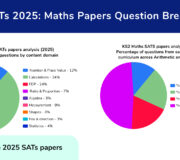Maths Boosters For SATs: How To Get The Most Out Of Maths Revision For Your Year 6 Pupils
If SATs results last year were not as expected, if closing the attainment gap in Maths is part of your SIP or if you’re just looking for ideas to ensure your Year 6 ‘smash their SATs’ in May’s KS2 National Assessments, you will probably be looking at maths boosters for certain target groups in Year 6 – and possibly even lower down the school.
But getting the most out of your maths revision lessons – whether run in-house or externally – is often times its own difficulty. But it’s not impossible! Here are just three of the ways you can design your maths boosters to have the greatest benefit for pupils facing the Key Stage 2 SATs.
Maths Boosters: Three Tips To Maximise Intervention Effectiveness
All these maths booster tips are taken from our experience running our KS2 maths intervention programme for SATs, from summer term Year 5 to summer term Year 6 every year.
Year 6 Maths Catch-up and Revision Guide
Get 17 teacher-tested techniques to help your pupils ace their KS2 SATs. Provides a friendly, approachable style with proven success.
Download Free Now!1. Expose your pupils to SATs-questions
It might seem like a bit of a no-brainer, but familiarising pupils with the sorts of questions they’ll encounter in the SATs is one of the best ways to boost their skills and confidence.
This means doing more than just using past papers as an assessment tool, however. For more complex question styles (such as multi-step reasoning problems) real time needs to be spent going over worked examples and practice questions to help pupils work out how to approach and solve them.
Taking at look at this collection of maths reasoning questions will allow you to work through the different kinds of questions with your class. Not only is each type of reasoning question identified, key information about how to solve them is also presented together with additional practice questions.
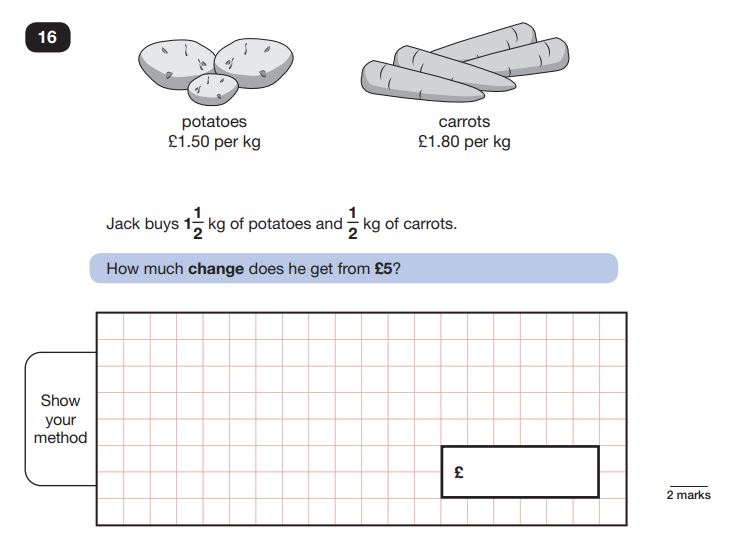
As it gets closer to May, SATs revision – and especially revision using past or practice papers – will become more prevalent. But it’s important to ensure this practice is still grounded in teaching pupils, not testing them; there are numerous ways of using the free SATs papers available online outside of mock exams.
SATs revision games are becoming an increasingly popular way of helping your pupils keep their skills sharp, and a great way to introduce some variety to your SATs revision lessons!
Third Space Learning has hundreds of SATs questions available free including several resources that collect KS2 SATs questions by topic that you can use to tackle specific weaknesses one at a time.
At Third Space Learning, we’ve designed our SATs intervention programme with this in mind; the summer and autumn term lessons are focused on helping pupils make progress in their maths learning. In Spring of Year 6 however, we pivot to plugging gaps and reinforcing knowledge, building on the work of the previous two terms so pupils naturally apply what they have learnt.
A key part of this programme are our SATs-style questions, which are embedded into lessons to ensure pupils are exposed to them in context, giving them a feel for what they’ll be facing in a safe learning environment.
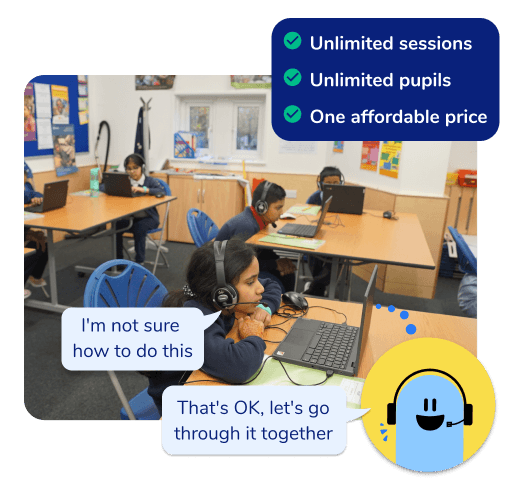
Unlimited primary maths tutoring with Skye, the voice-based AI maths tutor.
Built on the same principles, pedagogy and curriculum as our traditional tutoring, but with more flexibility, reach and lower cost.
Join the schools already helping hundreds of primary pupils nationwide with Skye’s one to one maths tutoring.
Watch Skye in action2. Help pupils get used to explaining their numerical reasoning
By Year 6 most pupils will have some experience of having to explain how they worked an answer out. But the process of developing reasoning skills might not be fully embedded yet, especially if it involves a more complex part of maths e.g. a problem involving decimals or 3D shapes.
Moreover many questions (especially those dealing with long multiplication and long division) will ask for pupils to show their working, and in some cases only award full marks for working that is predominantly numerical.
KS2 maths boosters can provide pupils with additional practice of showing their working numerically and (depending on the time available) can work their way from relatively simple (but crucial) topics such as place value and number lines upwards.
Skye, the AI maths tutor, is trained to encourage pupils to explain their reasoning, using techniques such as ‘I Do, We Do, You Do’ to model effective reasoning, practise it with pupils, and then have them attempt it themselves.
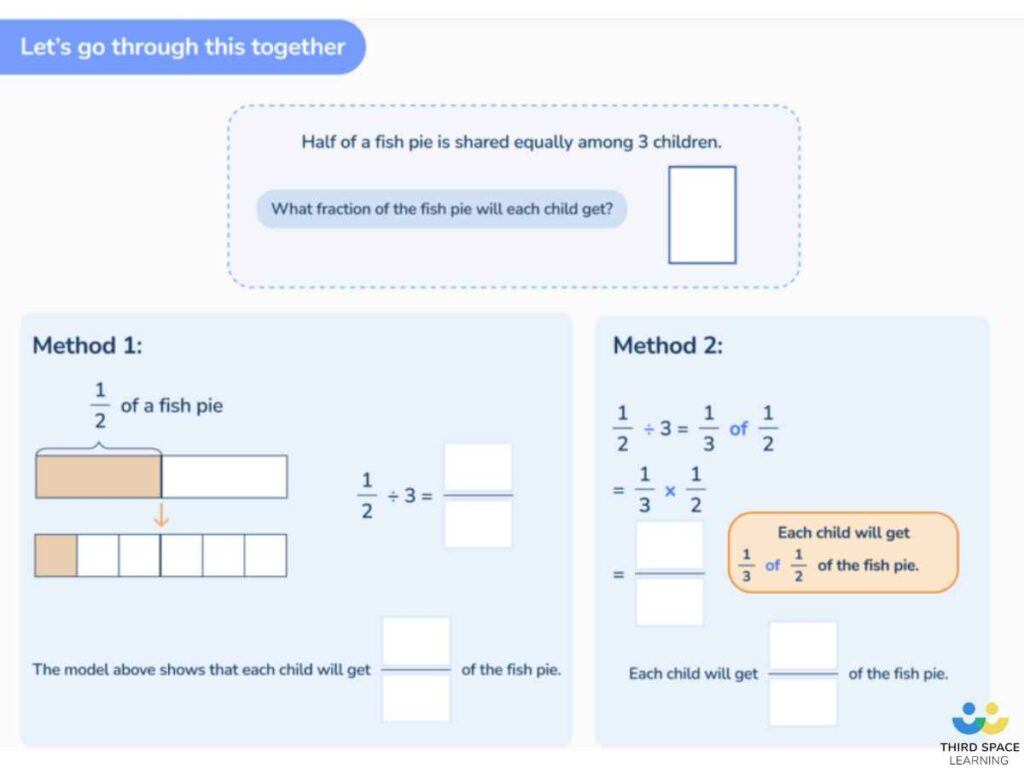
3. Plan out the topic coverage of your maths booster lessons well in advance.
Even with the most well-structured KS2 SATs revision plan it will be impossible to cover every topic that each student in your class struggles with. Some, like long division or negative numbers, will be common across many children and warrant looking over again as a class.
But if you have a pupil or small group of pupils who struggle with quadrilaterals, interpreting pie charts, or reading scales, it’s unlikely this particular weakness will find its way onto your revision list.
In these cases you may run a maths booster in-house, with teaching assistants taking pupils out of lessons to work on their specific weaknesses while the rest of the class covers something else. But it’s worth making sure that these are well planned out – it can be very easy to focus too long on one thing and forget another in the run-up to the SATs.
Moreover it can be difficult to work out what is and isn’t worth revising; no-one wants to spend two lessons helping pupils shore up their understanding of properties of shapes only to find that you missed mixed fractions, and then there were only one or two ‘shapes’ questions across the three SATs papers.
To help with planning out a broad and impactful maths booster plan you may want to look at this KS2 maths SATs revision programme that sets out a revision plan covering topics in what we believe is the best mixture of “topics likely to come up frequently” and “topics that pupils often struggle with”, and is what we use for our online one-to-one maths lessons.
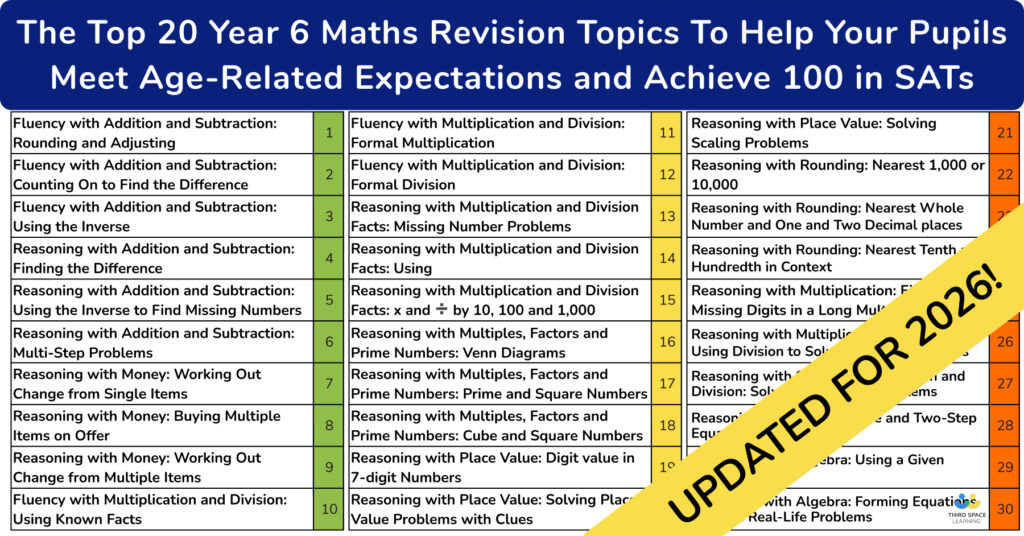
We put so much stock by this revision sequence because it has the numbers to back it up: it was created by our curriculum team after analysing every past SATs paper since 2016, along with answers to questions from the 50,000+ pupils we’ve taught as part of our interventions.
Maths Booster Resources Available FREE From Third Space
Year 6 Maths Catch-up and Revision Guide for KS2
We’ve worked with TES blogger, Rising Stars author, and Headteacher Claire Lotriet to pull together some of the best ideas for plugging gaps in Maths, building strong foundations, and ensuring that your Year 6 class can enter the national tests with confidence and tried and tested strategies they know how to use.
What’s included?
- Why everybody should be doing 5-a-day and how you can start it
- How to deal with tricky multiplication and division questions
- The 5 steps in the problem-solving cycle
- How to develop mathematical thinking through explanations
- The variations to a Maths reasoning problem that can trip children up and how to fix this
…and more!
Download your Year 6 Maths Catch-up and Revision Guide for KS2
SATs Revision Lessons
Looking for something a little more pupil-facing? Our online Maths Hub includes several SATs revision packs with teaching guidance, pupil practice sheets and activity slides – perfect for securing pupils’ abilities in various topics.
Download a free set of 3 lessons now, focused on Ordering and Comparing Numbers To 3 Decimal Places.
Rapid Reasoning for Year 6
One of our most popular resources, Rapid Reasoning helps pupils develop strong reasoning skills through daily practice of problem solving questions. It pairs extremely well with our ‘Fluent in Five‘ resource to get your pupils just as strong in numeracy and reasoning.
A pack of six weeks’ worth are free to download, and you can get the full 36 week set (to pick and choose from for SATs revision) by joining our Maths Hub.
Year 6 Rapid Reasoning (Weeks 1-6)
Finally, we also have a series of ‘SATs in Minutes’ videos, again on our Maths Hub. These short videos break down exactly how to answer particular questions, providing a nice visual model for when you’re running low on time!
DO YOU HAVE STUDENTS WHO NEED MORE SUPPORT IN MATHS?
Skye – our AI maths tutor built by teachers – gives students personalised one-to-one lessons that address learning gaps and build confidence.
Since 2013 we’ve taught over 2 million hours of maths lessons to more than 170,000 students to help them become fluent, able mathematicians.
Explore our AI maths tutoring or find out about year 6 SATs for your school.



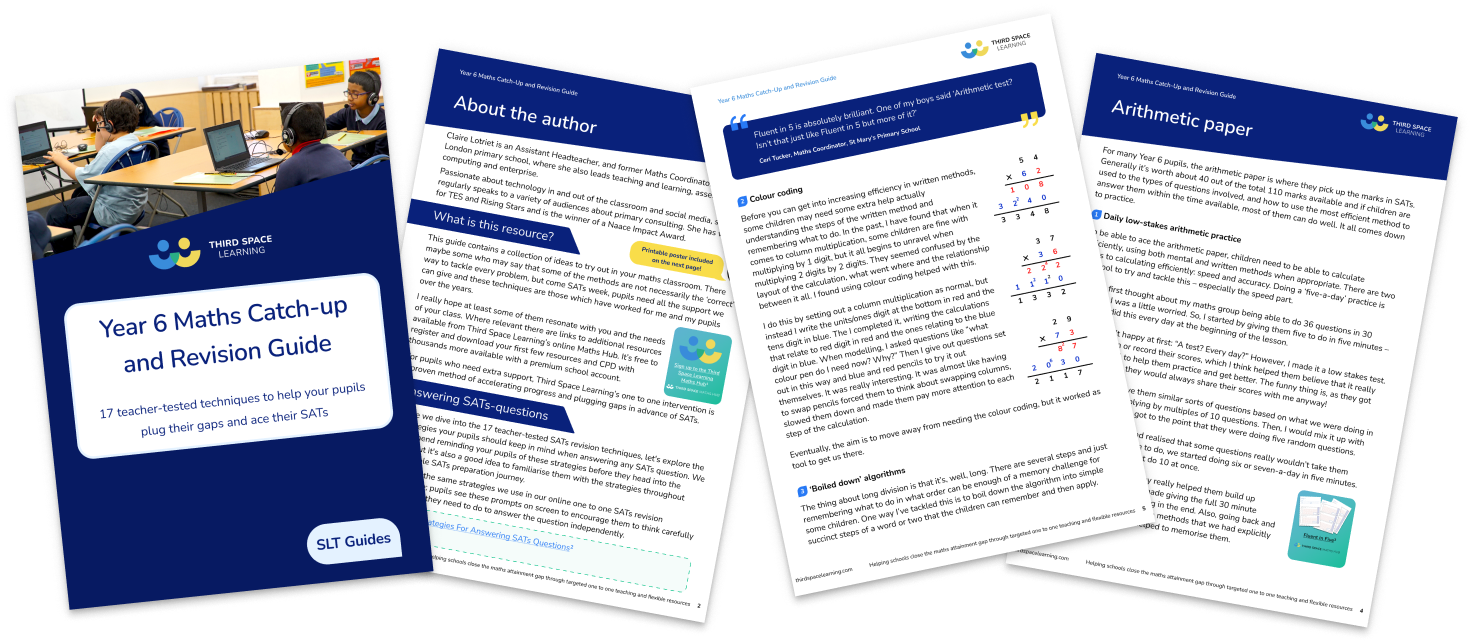
![The Top 20 SATs Revision Topics For 2026 [Video]](https://thirdspacelearning.com/wp-content/uploads/2026/01/SATs-webinar-2025-social-image-6-180x160.png)


